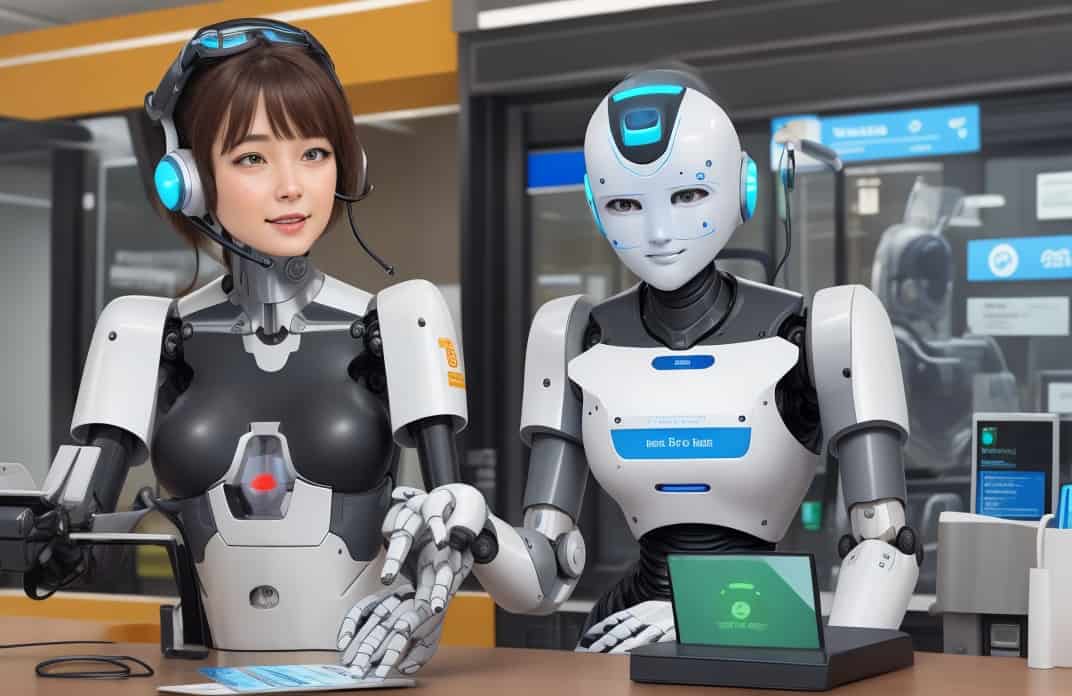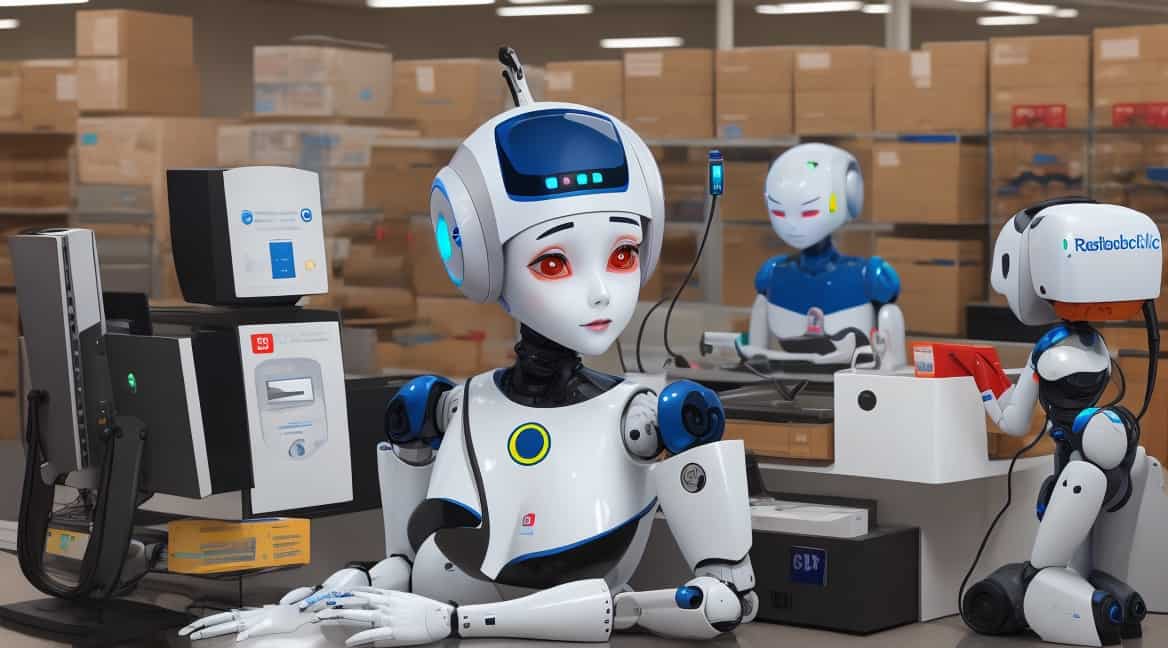Transforming Customer Support with AI

- August 25, 2023
- allix
- AI in Business
Traditionally, customer support has involved interactions with human agents through phone calls, emails, or live chats. While effective, this approach often faced challenges such as long wait times, inconsistent responses, and limited availability outside of business hours. The introduction of AI-powered chatbots has disrupted this paradigm by providing an instant and continuous customer support experience.
Chatbots are software applications that leverage Natural Language Processing (NLP) and machine learning algorithms to engage in human-like conversations with users. Their ability to understand context, recognize intents, and provide relevant responses has transformed customer support from a transactional interaction to a personalized and efficient conversation.
This transition from traditional support methods to AI-powered chatbots is akin to shifting from a static to a dynamic engagement model. Unlike pre-defined response scripts, chatbots adapt and learn from each interaction, continuously improving their responses and accuracy. This dynamic nature allows chatbots to accommodate a wide range of customer inquiries and deliver tailored assistance, contributing to the evolution of customer support.
Enhancing User Experiences
One of the most profound impacts of chatbots on customer support is the enhancement of user experiences. Unlike traditional support methods, chatbots can provide instant responses and solutions, irrespective of the time of day. This immediacy aligns with the expectations of today’s tech-savvy consumers who value quick and efficient interactions.
Chatbots excel at personalization. By analyzing user data and past interactions, they can tailor responses and recommendations to individual preferences and needs. This level of personalization fosters a sense of connection and loyalty between customers and brands. Customers feel understood and valued when their inquiries are met with relevant and contextual responses, thus fostering positive brand perceptions.
Consider a scenario where a customer visits an e-commerce website looking for a specific product. Through previous interactions and purchase history, the chatbot can anticipate the customer’s preferences, recommend similar products, and even offer discounts. This personalized experience not only streamlines the customer’s journey but also showcases the business’s commitment to understanding and catering to individual needs.
Reshaping Customer-Business Interaction
Chatbots have reshaped the dynamics of customer-business interaction by providing round-the-clock availability. Unlike human agents who are bound by office hours, chatbots can engage with customers 24/7. This availability ensures that customers receive assistance whenever they need it, contributing to increased customer satisfaction and retention rates.
Chatbots offer consistency in responses. Unlike human agents who may vary in their understanding or interpretation of a query, chatbots provide uniform and accurate information. This not only eliminates the risk of misinformation but also ensures a standardized experience for customers across different touchpoints.
Imagine a global e-commerce platform with customers from various time zones. With AI-powered chatbots, customers can receive support and information regardless of the time zone they are in. This seamless availability ensures that customer inquiries are addressed promptly, reducing frustration and enhancing the overall experience.
The Future Implications
As AI technology continues to advance, the future implications of chatbots in customer support are vast. Natural Language Understanding (NLU) is becoming more sophisticated, enabling chatbots to grasp nuances in language, slang, and even emotions. This evolution paves the way for more natural and human-like conversations, further blurring the line between human agents and AI-driven interactions.
Chatbots must navigate the complexities of ambiguous queries, emotional contexts, and cultural differences. Overcoming these challenges requires continuous refinement of AI models and training data, along with a balance between automated responses and seamless transitions to human agents when necessary.
To overcome these challenges, businesses are investing in creating hybrid models where chatbots handle routine inquiries and tasks while seamlessly transferring more complex or emotionally charged interactions to human agents. This transition from one mode to another highlights the importance of a harmonious interaction between AI and human support.
Leading Chatbot Names Transforming Business

As businesses increasingly recognize the value of AI-driven chatbots, numerous platforms, and solutions have emerged to cater to various industries and use cases.
Zendesk Chatbot is a powerful customer service chatbot designed to enhance customer interactions across various channels. It leverages AI to provide instant responses, personalized recommendations, and seamless transitions to human agents when needed. The chatbot can be integrated with Zendesk’s customer service software, offering a unified solution for managing customer inquiries and support.
Intercom offers an AI-powered chatbot that enables businesses to engage with customers at various touchpoints, from websites to mobile apps. The chatbot assists in lead generation, customer onboarding, and support inquiries. It can route conversations to relevant teams, ensuring that customers receive accurate and timely responses.
Drift’s chatbot is designed to drive sales and marketing interactions. It engages website visitors, qualifies leads, and schedules appointments with sales representatives.
Ada is an AI-powered chatbot platform that specializes in automating customer support workflows. It offers self-service solutions by providing instant answers to frequently asked questions and routing complex inquiries to human agents. Ada’s machine learning capabilities enable it to continuously improve its responses over time.
IBM’s Watson Assistant is a versatile AI chatbot that can be tailored to various industries and use cases. It offers natural language understanding, enabling it to comprehend user queries and provide contextually relevant responses. Businesses can integrate Watson Assistant into websites, mobile apps, and messaging platforms.
Aivo’s chatbots are designed to enhance customer engagement in multiple languages. They offer personalized recommendations, gather user feedback, and assist with inquiries. Aivo’s chatbots can be integrated into websites, messaging apps, and social media platforms, providing a consistent user experience.
Tars focuses on creating conversational landing pages and chatbots for lead generation and customer engagement. It enables businesses to build interactive, dynamic conversations that guide users toward specific actions, such as signing up for newsletters or scheduling appointments.
Salesforce Einstein Bots are AI-driven chatbots integrated with the Salesforce platform. They assist sales and customer service teams by automating routine tasks, providing instant responses to inquiries, and routing conversations to the appropriate departments.
LivePerson offers AI-powered chatbots for businesses seeking to enhance customer engagement and support. These chatbots can be used across various channels, including websites, messaging apps, and social media platforms.
Bold360’s AI chatbot platform focuses on delivering personalized customer experiences. The chatbots engage users in natural conversations, understand user intent, and offer relevant solutions. Bold360’s solutions are designed to scale, ensuring efficient customer interactions even during peak demand.
Categories
- AI Education (39)
- AI in Business (65)
- AI Projects (87)
- Research (77)
- Uncategorized (3)
Other posts
- Neck Liposuction Abroad: Say Goodbye to Double Chin, Hello to Defined Confidence
- Dental Veneers Abroad: Get Your Dream Smile for Less
- Endoscopic Brain Surgery Abroad: Safe, Affordable & Advanced Options You Can Trust
- Say Goodbye to Unwanted Moles: Discover Safe, Affordable Mole Removal Abroad
- Mastoidectomy Abroad: Affordable, Safe, and Life-Changing Ear Surgery
- Buccal Fat Extraction: Sculpt Your Dream Look with the Experts at Best Clinic Abroad
- Get Fast Relief from Spinal Fractures: Kyphoplasty Surgery Abroad with BestClinicAbroad
- Curious About Genetic Testing for Fertility? Here’s What You Need to Know (and Why People Trust Best Clinic Abroad to Book It)
- Hip Pain Ruining Your Life? Here’s Why More People Are Getting Hip Replacements Abroad with Best Clinic Abroad
- Breathe Easier: Why Best Clinic Abroad is Your Top Choice for Septoplasty
Newsletter
Get regular updates on data science, artificial intelligence, machine



